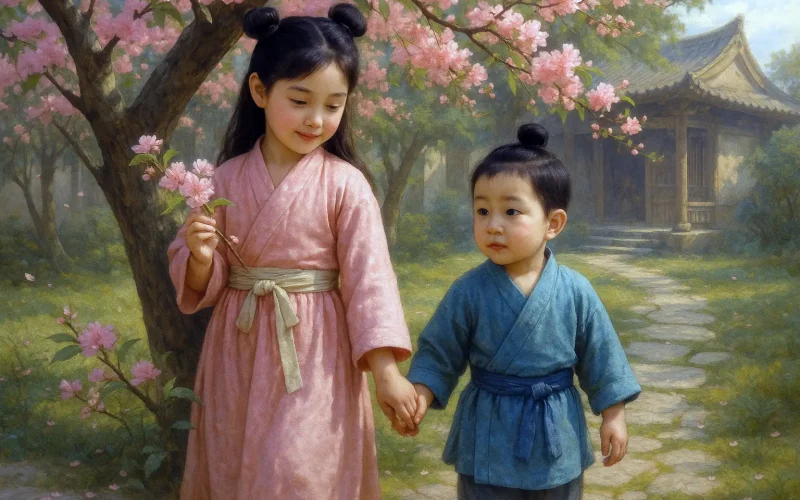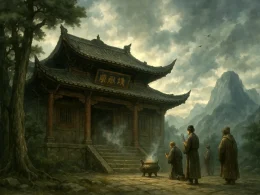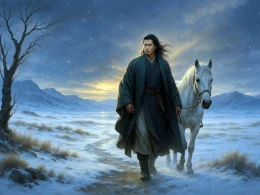The Long River grieves over my long stay,
For my home is a thousand miles away.
Now blows the evening wind so high;
From mountain to mountain yellow leaves fly.
Original Poem:
「山中」
王勃
长江悲已滞,万里念将归。
况属高风晚,山山黄叶飞。
Interpretation:
This poem was likely written during the Tang dynasty poet Wang Bo's stay in the Sichuan region, where he found himself stranded due to his difficult career path. While traveling, he observed the autumnal scenery in the mountains, which stirred deep emotions, leading him to express his longing for home and his sorrow at being far away. The poem skillfully combines descriptive imagery with lyrical expression, vividly portraying the poet’s melancholy as a traveler yearning to return.
First Couplet: “长江悲已滞,万里念将归。”
(The Yangtze seems weighed down with sorrow, as though it shares my grief. I, too, am burdened with longing, yearning for my distant homeland.)
The poet personifies the Yangtze River, imbuing it with his own feelings of sorrow. Although the river itself is emotionless, the poet projects his inner turmoil onto the natural world. The word "stagnant" symbolizes his prolonged stay in a foreign land, while the phrase "yearn for home" directly expresses his deep desire to return. These lines encapsulate the poet's suffering, both from the spatial distance separating him from home and the temporal stagnation he experiences far from it.
Second Couplet: “况属高风晚,山山黄叶飞。”
(It is the high season of autumn, and in the mountains, yellow leaves scatter and dance in the wind.)
On the surface, this couplet describes the scenery, but it is also a deeper reflection of the poet's feelings. The desolate image of autumn wind and falling leaves mirrors the poet’s loneliness and homesickness. Through the bleak autumnal landscape, the poet evokes a sense of isolation and drifting, seamlessly blending external imagery with internal emotion. The interplay of scenery and sentiment enhances the poem's depth and poignancy.
Features of the Poem
- Fusion of Scenery and Emotion
The poet masterfully intertwines subjective emotion with the natural world, using the "stagnant Yangtze" and the "yellow leaves flying" to subtly convey his loneliness and yearning. In particular, the line “mountain upon mountain, yellow leaves swirl” merges the somber autumn atmosphere with the poet’s melancholy, achieving an understated elegance. - Blending Subjectivity and Objectivity
The phrase "The Yangtze grieves its stagnant flow" reflects the poet's subjective projection onto an objective landscape, while "yellow leaves swirl in the wind" combines tangible descriptions with emotional resonance. This interplay of the real and the symbolic deepens the poem’s meaning. - Allusions and Rich Associations
The poem subtly echoes the sentiment of Song Yu’s Nine Changes: “How sorrowful is the autumn air! The trees and grass wither and fade.” Without overtly referencing the original text, the poet weaves its essence into his emotional expression, evoking a profound sense of nostalgia and transience. - Concluding with Scenery, Implicit Yet Profound
The final line, “mountain upon mountain, yellow leaves swirl,” is ostensibly a description of nature, but it carries the poet’s deep emotions. As Southern Song critic Shen Yifu suggested, “Ending with scenery best conveys sentiment.” This poem exemplifies that idea, leaving readers with an open-ended, evocative image that invites reflection and imagination.
Overall Appreciation
With concise language, In the Mountains conveys Wang Bo’s complex emotions of homesickness and solitude. The opening couplet introduces his sorrow through the Yangtze, while the closing couplet concludes with the desolate imagery of autumn leaves, amplifying the atmosphere of loneliness. Through vivid descriptions of nature, the poet imbues the landscape with his emotions, achieving a seamless blend of scenery and sentiment. The poem’s concise, profound style not only captures the poet’s inner world but also portrays the archetypal figure of a wanderer yearning for home.
Inspiration
This poem teaches us that emotions can be effectively conveyed by drawing on natural imagery. By blending sentiment with scenery, the poet enriches the layers of emotional expression and enhances the artistic power of the work. Moreover, the poem exemplifies the beauty of subtlety. With minimal words, it creates a vast and profound emotional resonance, leaving ample room for the reader’s imagination. This “meaning beyond words” approach is a valuable technique worth learning and applying.
Poem translator:
Xu Yuan-chong (许渊冲)
About the Poet:
Wang Bo(王勃) was a native of Hejin, Shanxi Province, circa 650 - 676 AD. He was a native of Hejin, Shanxi Province. He showed his talent when he was young, and was known as one of the “Four Great Poets of the Early Tang Dynasty” together with Yang Jiong, Lu Zhaolin, and Luo Binwang. Wang Bo's poems emphasized his personal life, but there were also a few poems that expressed his political sentiments and implied his dissatisfaction with the rich and powerful families, and his style was relatively fresh.












